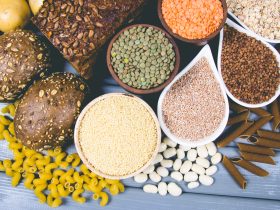Vitamin B12 plays a crucial role in various bodily functions, contributing to the synthesis of DNA and red blood cells. Its significance lies in supporting overall health and well-being.
Since the human body doesn’t produce vitamin B12, it must be obtained from external sources. These sources primarily include animal-based foods such as meat, fish, eggs, and dairy products. Alternatively, individuals may opt for B12 supplements to meet their nutritional needs consistently.
Regular and adequate intake of vitamin B12 is essential for maintaining health. Although the body stores vitamin B12 in the liver for up to 5 years, consistent dietary sources are required to prevent deficiency over time.
Recommended Daily Amounts of Vitamin B12
The recommended daily amounts of vitamin B12, measured in micrograms (mcg), vary across different age groups:
- Infants up to age 6 months: 0.4 mcg
- Babies ages 7-12 months: 0.5 mcg
- Children ages 1-3 years: 0.9 mcg
- Kids ages 4-8 years: 1.2 mcg
- Children ages 9-13 years: 1.8 mcg
- Teens ages 14-18: 2.4 mcg (2.6 mcg per day if pregnant and 2.8 mcg per day if breastfeeding)
- Adults: 2.4 mcg (2.6 mcg per day if pregnant and 2.8 mcg per day if breastfeeding)
It’s important to note that these recommendations can be influenced by various factors, including individual dietary habits, medical conditions, age, and pregnancy or breastfeeding status.
Meeting these recommended amounts through a well-balanced diet, including sources of vitamin B12, is crucial for maintaining overall health and preventing deficiency-related issues.
If there are concerns about meeting these requirements, consultation with a healthcare professional is advisable.
Where to Get Vitamin B12 From
Vitamin B12 can be obtained from both natural animal sources and fortified foods. Here are some examples:
Natural Animal Sources:
- Meat (beef, pork, lamb)
- Eggs
- Dairy products (milk, yogurt, cheese)
- Fish (salmon, trout, tuna)
- Poultry (chicken, turkey)
Fortified Foods:
- Fortified nutritional yeast
- Fortified breakfast cereals
- Fortified plant-based milk alternatives (soy, almond, rice milk)
- Fortified meat substitutes (plant-based products designed to resemble meat)
When choosing fortified foods, it’s essential to check the product’s Nutrition Facts label to confirm the presence and amount of vitamin B12.
For individuals following a vegetarian or vegan diet, incorporating fortified foods or taking B12 supplements may be necessary, as B12 is primarily found in animal-derived foods.
Causes of Vitamin B12 Deficiency
While most people in the U.S. obtain sufficient vitamin B12, certain factors can contribute to a deficiency.
Some reasons include:
- Age-related Absorption Issues: With age, the ability to absorb vitamin B12 may decrease.
- Surgical Procedures: Individuals who have undergone weight loss surgery or stomach operations that involve the removal of part of the stomach may face challenges in B12 absorption.
- Heavy Alcohol Consumption: Excessive alcohol intake can hinder the absorption of nutrients, potentially leading to a B12 deficiency.
- Gastric Conditions: Conditions like atrophic gastritis (thinning of the stomach lining) and pernicious anemia (impairment of B12 absorption) can contribute to deficiencies.
- Small Intestine Disorders: Disorders affecting the small intestine, such as Crohn’s disease, celiac disease, bacterial overgrowth, or parasitic infections, may impact B12 absorption.
- Immune System Disorders: Conditions like Graves’ disease or lupus, which affect the immune system, can influence B12 levels.
- Medication Interactions: Certain medications, including proton pump inhibitors (PPIs), H2 blockers, and certain diabetes medications (e.g., metformin), can interfere with B12 absorption.
- Vegetarian or Vegan Diet: Individuals following strict vegetarian or vegan diets may face a higher risk of B12 deficiency due to the absence of animal products. In such cases, supplementation or the inclusion of fortified foods is recommended.
It’s essential to consult with a healthcare professional if there are concerns about B12 levels and blood tests may be conducted to assess the status of this vitamin.
Vitamin B12 For Pregnant and Breastfeeding Women
If you’re a pregnant woman following a vegan or vegetarian diet and plan to exclusively breastfeed your baby, it’s crucial to consult with your doctor before giving birth. Developing a plan to ensure adequate intake of vitamin B12 is essential for the health and development of your baby.
Insufficient vitamin B12 during pregnancy and breastfeeding can lead to developmental delays and hinder optimal growth and thriving in infants. To address this, it’s important to explore appropriate dietary strategies or consider vitamin B12 supplementation under the guidance of a healthcare professional.
Ensuring proper nutrition during this crucial period is vital for both maternal and infant health, and healthcare providers can offer tailored advice to meet specific dietary needs.
Vitamin B12 Deficiency – The Symptoms
Vitamin B12 deficiency can manifest in various symptoms, and if left untreated, it may lead to complications.
Common symptoms of vitamin B12 deficiency include:
- Gastrointestinal Issues: Symptoms may include constipation, diarrhea, loss of appetite, or gas.
- Nerve Problems: Numbness or tingling sensations, muscle weakness, and difficulties walking may occur.
- Pale Skin: Insufficient B12 levels may contribute to paleness of the skin.
- Smooth Tongue: Changes in the texture of the tongue, such as it becoming smoother, can be a sign of deficiency.
- Heart Palpitations and Shortness of Breath: Anemia resulting from B12 deficiency can lead to heart palpitations and difficulty breathing.
- Weakness, Tiredness, or Lightheadedness: Individuals may experience a general sense of weakness, fatigue, or dizziness.
- Vision Loss: In severe cases, vitamin B12 deficiency can lead to vision problems.
- Mental Health Issues: Deficiency can affect mental well-being, causing symptoms like depression, memory loss, or behavioral changes.
It’s important to note that a mild deficiency may not present noticeable symptoms initially. Regular monitoring of vitamin B12 levels through blood tests and prompt intervention, if deficiency is detected, can help prevent complications.
Individuals experiencing these symptoms should seek medical advice for proper evaluation and diagnosis.
Treatment of Vitamin B12 Deficiency
The treatment of vitamin B12 deficiency depends on the underlying cause and severity of the deficiency.
Here are common approaches:
- Dietary Changes
- For individuals with dietary restrictions, such as vegans or vegetarians, increasing intake of vitamin B12-fortified foods or supplements is essential.
- Consuming animal-based products like meat, fish, dairy, and eggs is an effective way to obtain vitamin B12 naturally.
- Supplements
- Oral vitamin B12 supplements are available and can be taken in pill form.
- High-dose oral supplements or nasal B12 supplements may be recommended in certain cases.
- Injections
- Individuals with conditions like pernicious anemia or difficulty absorbing vitamin B12 may require B12 injections initially.
- Regular injections may be necessary for those with ongoing absorption issues.
- Nasal Spray
- In some cases, B12 supplements are administered nasally for better absorption.
- Multivitamins
- Older adults with a vitamin B12 deficiency may benefit from daily B12 supplements or multivitamins containing B12.
It’s important to note that treatment usually resolves the deficiency, but any nerve damage resulting from the deficiency may be permanent.
Regular monitoring of vitamin B12 levels and adherence to the prescribed treatment plan are crucial for managing the deficiency effectively.
Prevention of Vitamin B12 Deficiency
Preventing vitamin B12 deficiency involves ensuring an adequate intake of the vitamin through various dietary sources or supplements.
Here are some preventive measures:
- Diverse Diet
- Include a variety of foods rich in vitamin B12 in your diet, such as meat (beef, poultry, pork), fish, seafood, dairy products, and eggs.
- Supplementation
- If you follow a vegetarian or vegan diet, consider taking vitamin B12 supplements or consuming fortified foods to meet your B12 requirements.
- Multivitamins containing B12 can be an option for those who may have difficulty obtaining enough through their diet alone.
- Regular Monitoring
- Individuals at risk of vitamin B12 deficiency, such as older adults, vegetarians, or those with absorption issues, should undergo regular monitoring of B12 levels.
- Routine blood tests can help assess vitamin B12 status and detect deficiencies early.
- Consultation with Healthcare Providers
- Before starting any supplements, especially if you are on medications, consult with your healthcare provider.
- Discuss your dietary habits, lifestyle, and any concerns about potential deficiencies with your healthcare team.
- Awareness of Symptoms
- Be aware of the symptoms of vitamin B12 deficiency, such as fatigue, weakness, and neurological issues.
- Seek medical advice if you experience symptoms or if you are at a higher risk of deficiency.
- Prenatal and Postnatal Care
- Pregnant and breastfeeding women should ensure they meet their increased B12 needs through diet or supplements.
Preventing vitamin B12 deficiency involves a combination of dietary choices, supplementation when necessary, and regular health check-ups.
















Find Us on Socials